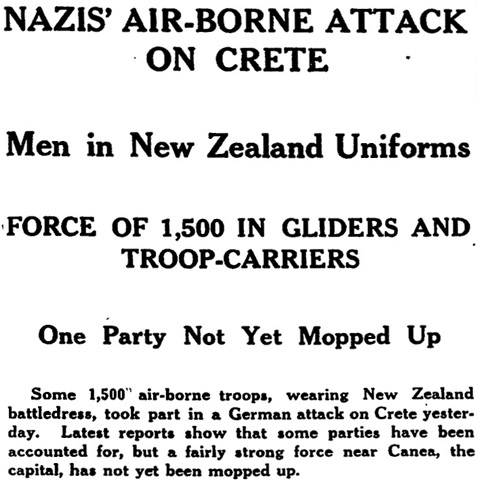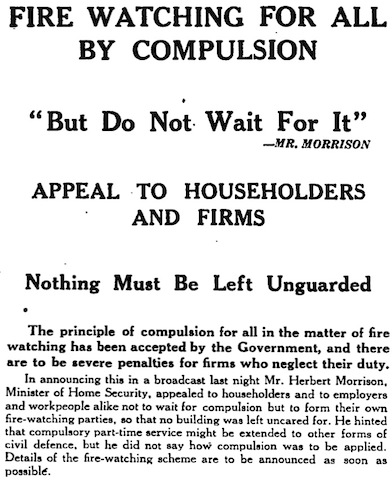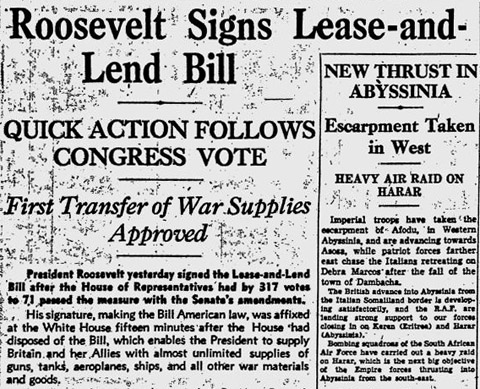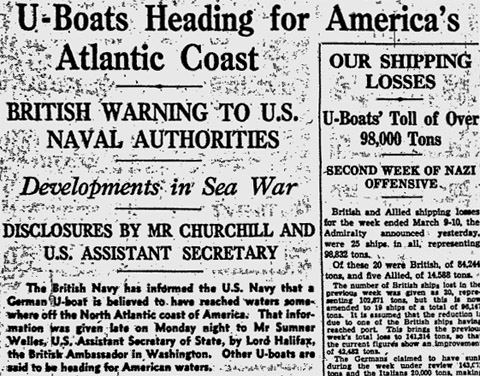
If there was a surprising absence of speculation yesterday about the reasons behind Hess’s flight to Britain, that omission has been handsomely rectified in today’s newspapers. The Times even goes so far as to declare in its headlines that Hess, ‘essentially an idealist’, was ‘disillusioned’ (4).
Why? He is believed first to have become more and more disgusted by the trickery and shamelessness of Hitler’s entourage. More than that he is believed to have become horrified by the bloodshed which he saw around him and by the prospect (held out in Hitler’s last speech) of still further bloodshed “wherever and whenever I command the German soldiers to march.” In all his speeches Hess has glorified the power of the German Army, but always (much more than any other German leader) he has insisted that the true aim should be a final peace.
A further report (from the German frontier, based on ‘Current gossip in Germany’!) notes that during Hitler’s speech in the Reichstag on 4 May, Hess ‘appeared detached, expressionless, and almost bored, and contrasting this with his habitual and profoundly devotional attitude towards Hitler’ (3).
The leading article, however, hints at ‘a dispute in the Party ranks of so grave a character that HESS felt himself no longer safe’ (5). Analysis by the diplomatic correspondent to the Manchester Guardian tends to agree (5), adding that
There may be movements afoot for a purge in the party of those in disagreement with the present drift of German policy, which appears to be drawing closer to Soviet Russia. It is difficult to judge from outside, but Russia seems to be responding, and there are Germans who fear the alliance.
The proposal is also made that Hess fears German over-expansion, as he ‘doubtless realises that conception of European conquest is beyond the German strength’. But then another article in the same paper (credited simply to ‘a correspondent’) suggests ‘a more sinister explanation of the whole affair’ (8):
The possibility that Hitler himself sent Hess to England to set the one unconquered and unconquerable foe on a false scent cannot be ruled out altogether, as the very fact that it was the “faithful, idealistic Hess,” certainly no self-seeker, makes the matter only more suspicious.
The German line on Hess has changed a little since yesterday. It is still suggested by Nazi party headquarters that Hess ‘has for years suffered physically, and increasingly took refuge in various forms of hypnotism and astrology, &c.’ But the main emphasis now is on his idealism:
He knew the many peace offers made by the Führer, which came from the bottom of his heart, better than anyone else. Apparently he laboured under the impression that by personal sacrifice he could prevent a development which in his eyes would end only in the complete destruction of the British Empire.
There are also hints of a possible British ‘trap’ and (in a ‘semi-official statement’) the use of torture to extract information from him now that he is in British custody.
Let us turn to other news. Herbert Morrison, Minister of Home Security, has announced that the government intends ‘to transfer the fire services for the time being from local to State control’ (The Times, 4). Eventually the local fire brigades will be re-organised into ‘larger units and to constitute mobile fire-fighting units’. Parliament seems happy with this news; but given that The Times itself called for exactly this to happen only a few days ago you’d think it would have made a bigger deal out of it.
German air activity over Britain in the past few days has been ‘slight’, according to the official communiqué reprinted in the Guardian (5):
Following Monday’s lull, no night attacks were reported up to an early hour this morning [Tuesday]. Enemy ‘planes flew over the coasts at a few points, but no incidents apparently followed.
Perhaps the Luftwaffe has been listening to the Bishop of Chichester. He, along with George Bernard Shaw and Gilbert Murray, recently put forward the idea ‘that the Government should intimate its willingness to cease night bombing of German towns and cities if the German Government will agree in its turn to cease from night activities over this country’ (3). This idea certainly receives the ‘warm endorsement’ of ‘”Christianity Calling,” a new movement uniting progressive Christians’, as expressed by a letter from its honorary general secretary Albert D. Belden.
We feel strongly that the least the Christian Churches can do amid the present horror is to seek to temper its savagery as far as possible, and that, therefore, this proposal should have the support of the whole Christian public of this country.
The Bishop of Derby, Dr Rawlinson, would seem to agree, at least in principle. Speaking at a diocesan conference in Derby he spoke out against ‘the demand for reprisal raids’.
“As the struggle intensifies,” he said, “it is of vital importance that we should be continually on guard against the peril of lowered standards and smirched ideals. I should very greatly regret it if a time were ever to come when our airmen were asked to indulge in raids terroristic in motive against admittedly non-military objectives. I am not of the opinion that those who have personally suffered through air raids for the most part either demand or desire the kind of retaliation which I would deprecate.
On Monday night, Bomber Command attacked ‘Mannheim, the great German industrial and commercial centre, which possesses the second largest inland docks in Europe’ (8).
In the House of Commons yesterday (in its new digs thanks to the Luftwaffe), the Independent Labour Party MP James Maxton asked why the police had raided the homes of Scottish Nationalists, and detained some of their occupants (2). Replying for the government, the Lord Advocate Thomas Cooper said that ‘search warrants obtained under Defence Regulation 18B were executed on May 3 at certain premises at which it was believed the evidence would be found pointing to the commission by certain persons of acts prejudicial to public safety and the defence of the realm’. Apparently they didn’t find too much: one person was detained under 18B, another for contravening the National Armed Forces Act (presumably failure to register for conscription or something of that nature) and a third on firearms offences. In Maxton’s opinion, it was all ‘Just a lot of damned rubbish’.
Also in the Commons, Captain Margesson, Secretary for War, announced that three men, including an officer, will be court-martialled for their involvement in the Dunera affair. A gloss explains (8):
[The steamship Dunera took 2,400 refugees, mostly class A Jews, friendly aliens, from this country to Australia. After a number of allegations had been made it was stated in the Commons in February that “in order to clear Britain’s good name” compensation would be paid to those internees who had suffered loss.]
Which doesn’t make clear what is alleged to have happened, but then I suppose to repeat it would re-blacken Britain’s good name.
![]() This work is licensed under a Creative Commons Attribution-NonCommercial-NoDerivatives 4.0 International License.
Permissions beyond the scope of this license may be available at http://airminded.org/copyright/.
This work is licensed under a Creative Commons Attribution-NonCommercial-NoDerivatives 4.0 International License.
Permissions beyond the scope of this license may be available at http://airminded.org/copyright/.






Pingback: Airminded · Friday, 16 May 1941
Pingback: Airminded · Wednesday, 21 May 1941